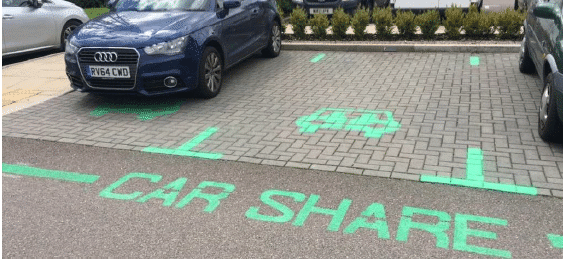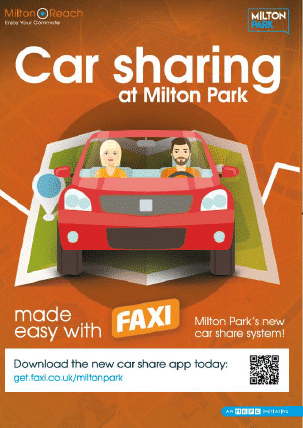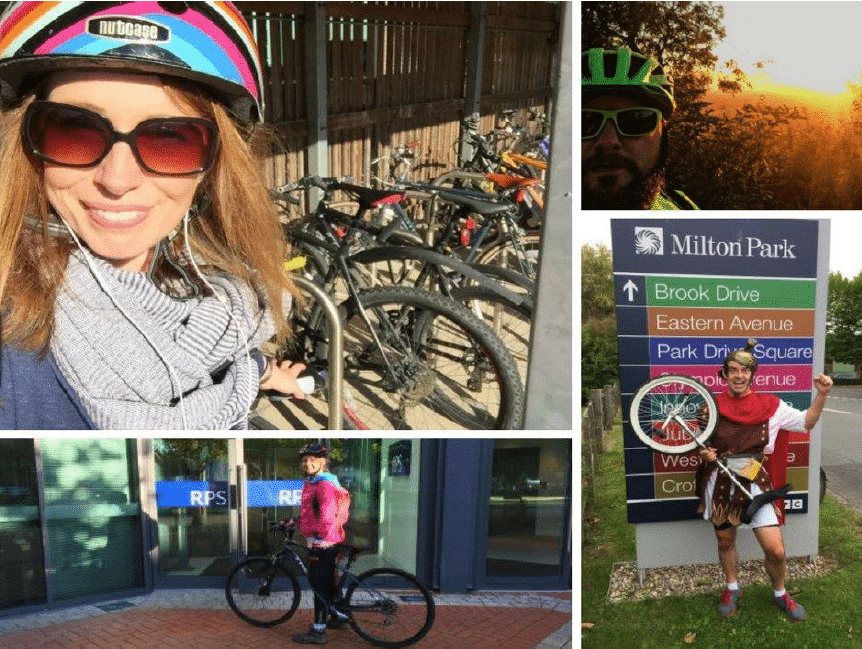Working the angles
Mobility behaviour change at large business parks begins with changing user behaviour and engaging businesses, according to Alexandra Kershaw. Facilitating modal shift through both bottom-up and top-down engagement is key
The drive to shift employee travel behaviour to more sustainable modes has been a salient issue in recent years, to meet end-goals such as sustainability targets, reducing negative environmental externalities, or facilitating other benefits such as enabling previously ‘locked’ land (eg, car parking) to be re-purposed.
By shifting towards a more sustainable modal share at a large business park, multiple benefits for employers and employees on the park can be realised such as improved recruitment and retention of staff and re-purposing of car parking space to other amenities. It also offers positive externalities for the surrounding area, such as reduced traffic congestion and emissions: an important contributor to the growing Net Zero Carbon movement.
In order to engage best with the employees on the site, it was understood that not everyone would be motivated to change behaviour by the same offering
One example where great success has been realised in terms of reducing single-occupancy car journeys is at Milton Park, a 300 acre, high-tech business and science hub located in Oxfordshire, UK. There are 9,100 workers based at the site, which is managed by MEPC.
It was decided that in order to help the sustainable growth of the park it was necessary to consider how to best move people rather than how to move cars. There was the opportunity to use the park as a test site for delivering good practices in advancing shared mobility and active travel, and to realise health, economic, social and environmental benefits.
In order to identify and deliver an integrated programme of sustainable mobility initiatives, Veronica Reynolds from Vectos was appointed as a Behavioural Change Advisor to be on-site, full-time, to take this agenda forward. Her main objective was to engage with businesses and employees and achieve behaviour change away from single occupancy vehicle use.
MILTON PARK CASE STUDY
MONITORING
Data and ongoing monitoring of progress against set targets is crucial to understanding the complex patterns of travel behaviour at Milton Park and to identifying which measures are likely to have the greatest impact on travel choices. To this end, comprehensive Travel Surveys have been completed in 2016, 2017 and 2018 with a record response rate of 22 percent that led to the creation and ongoing development of a Travel Plan and targeted Travel Campaign and a range of initiatives to encourage sustainable travel.
In addition, Milton Park invested in a state-of-the-art traffic sensor project operated by VivacityLabs to capture real-time data on all traffic movements in and out of the Park. The system enabled the measuring of the impacts of initiatives and provided data to the local authorities to help inform decisions about investment in cycling and road infrastructure.

Vivacity captures real-time data on all traffic movements in and out of Milton Park
ENGAGEMENT
With Employees…
In order to engage best with the employees on the site, it was understood that not everyone would be motivated to change behaviour by the same offering. Therefore a range of strategies were implemented that brought a focus towards different aspects of
sustainable mobility.
The Milton Park website travel pages were updated and upgraded to prioritise sustainable modes over driving and to reflect the messaging of the Milton Park sustainable travel campaign ‘Enjoy your Commute’. Marketing and promotional materials, including posters, leaflets and loop presentations (company lobbies and public areas, for example) have been produced and updated regularly to highlight current initiatives. Signposting and signage across the Park is being upgraded and now includes motivational messages extolling the benefits of active travel for air quality and physical activity.
In addition, a number of initiatives to incentivise active travel have taken place, including a monthly ‘Bike to Work’ day with free breakfast and a ‘Bike Doctor’, carrying out free maintenance checks on site. In addition, Milton Park has organised an annual ‘car free day’ challenge with prizes for the companies with the highest proportion of participants, including a £500 (€580) donation to the charity of their choice and prizes for the ‘quirkiest’ non-motorised form of transport.
To ensure employees voices are heard, a bus and bicycle users’ group was also established and they are regularly consulted about proposed interventions and changes to services.
With Businesses…
One key element that contributed to the success at Milton Park was the formation of a Travel Forum, in which 53 of Milton Park’s companies were represented at quarterly meetings. In these meetings, HR staff and Directors met with the Behaviour Change Advisor to discuss key messages for the park. The group acted collectively to represent Milton Park businesses’ interests when it came to local transport infrastructure and jointly commented on transport and infrastructure decisions that would have had an impact on their business, eg local road closures or deficiencies in local infrastructure such as lack of safe cycle routes. Meaningful partnerships have also been established with Oxfordshire County and District Council to prioritise work on the cycle routes around Milton Park, with four important routes now being upgraded.
The Behaviour Change Advisor continues to work closely with new businesses before they move to the Park, in order to influence new occupiers before they decide to default to single occupancy car use. By engaging prior to a move to the site, the key values of the new occupier can be understood, such as a focus on productivity and recruitment, and the new employers can portray specific messages to potential employees, such as health benefits and mobility options that work as draw to potential employees and that increase employee retention.
Key relationships have also been established with bus and train companies with a view to agreeing discounted fares for Milton Park employees and improving services
With PT companies…
Key relationships have also been established with bus and train companies with a view to agreeing discounted fares for Milton Park employees and improving services.
IMPLEMENTATIONS TO ENCOURAGE BEHAVIOUR CHANGE
Car Sharing
A new state-of-the-art ride-sharing platform has been launched. FAXI provides users with an easy-to-use app to link them with fellow commuters to share their car journeys, linked through a digital wallet. FAXI detects which vehicles are genuinely shared journeys, triggering incentives, rewards and preferential access to car parking. There are 45 carpool parking spaces within the park, with many more planned thanks to its growing in popularity. Today, 13% of employees now regularly share their journeys. The monetary savings can be as much as £1000 per year for the average journey to Milton Park.

Milton Park Bike Loan Scheme
To encourage the take-up of active travel, a bike loan scheme, operated by the Oxford-based Bainton Bikes using Donkey Republic software to unlock and rent the bikes, has been set up and is proving extremely popular with over 150 rentals each month. The bikes are provided free to Milton Park occupiers and can be picked up or dropped off at a number of ‘hubs’ around the Park and at Didcot Parkway station, forming crucial “last-mile” connectivity.

Milton Park Shuttle Bus
The Milton Park shuttle bus service between the Park and Didcot Parkway has been expanded to include a third hybrid double decker bus. WiFi has been added to all the buses to attract commuters wishing to work on board. The shuttle bus operates between the station and the Park and is available for use by Park occupiers for £20 per year in order to incentivise commuters to use combined rail and bus, rather than to drive. The service has recently been opened up for use by local residents (also for £20 per year) and around 55 people have taken up this opportunity. The bus has proved popular with school children from Sutton Courtenay who would otherwise have to pay a considerable amount for the local bus service or walk the 2.7 miles to school. The shuttle buses save on average 900 car journeys per day.
Infrastructure
In addition to providing employees with realistic alternatives to private car travel to and from the park, the infrastructure on the park has also undergone a review.
An audit of cycling facilities at Milton Park was carried out and priority areas for investment were identified, such as additional cycle storage and changing facilities. An additional 80 covered cycle storage spaces have been created and plans for new cycle hubs are being drawn up. A new cycle link created through the Backhill Tunnel has already had a significant impact on cycling levels in the area.
Parking issues have also been significantly alleviated and a new parking protocol (designed to reduce congestion) has been introduced which has proved successful and acceptable to occupiers at Milton Park.
There are also 35 Electric Vehicle charging points on site.
IMPACTS
The mode share split as a result of these measures:

The results of the Travel Surveys in October 2017 and 2018 show the extent of modal shift away from single occupancy vehicle use (SOV), from 69 percent SOV in 2016 to 63 percent in 2018 (6 percent reduction) and an accompanying rise in cycling from 7 percent to 11 percent. In addition, there are clear signs of a shift in attitude towards travel, the consequence of which is that Milton Park is becoming even more inclusive than it was before. Results to date show that more people are now aware of the choices in travel and there is a small, but growing, lesser reliance on single occupancy car use. Continued shift is expected in the next survey as the impacts of new infrastructure filter through.
The Behaviour Change Advisor fulfilled an important role in dealing with complaints from occupiers about travel matters from congestion, to parking, to bus complaints. This led to a very high level of engagement with occupiers and useful conversations which have helped to create a more positive narrative around development of the site. Veronica Reynolds was awarded the prestigious national award of ‘Smarter Travel Professional of the Year 2018’ and last year received the ‘Responsible Property Investors’ Sustainability Award for the work at Milton Park.
 Due to the success of the behaviour change initiatives within Milton Park, the park is now looking to the future to maintain these shifts and also to become a test-bed for new and exciting technologies to encourage more people to shift away from their private car.
Due to the success of the behaviour change initiatives within Milton Park, the park is now looking to the future to maintain these shifts and also to become a test-bed for new and exciting technologies to encourage more people to shift away from their private car.
GOVERNMENT GREEN-LIGHTS FIRST USE OF AUTONOMOUS VEHICLES ON UK ROADS
In February 2018, Innovate UK announced the award of £2.5 million to trial self-driving vehicles in and around Milton Park, where they will travel between private roads at Milton Park and the public roads that link the site with nearby transport services.
The 30-month MultiCAV project will be undertaken by a consortium of organisations with different sector backgrounds who are investing in the development of autonomous vehicles, and led by UK transport operator FirstGroup. Despite being relatively close to Didcot Parkway station, most travel to and from Milton Park is currently made in private vehicles, and with the site set to expand in the coming years, the MultiCAV consortium is building on the work already underway to provide the park with long-term, safe, sustainable transport. Commuters to the site will be able to connect with the 12-15 person self-driving pods from local transport services, while booking and paying for their trip in one easy process through a data aggregator, which is also being developed as part of the MultiCAV project. It is hoped that by the end of the trial up to 50 percent of private vehicle journeys within the business park will switch to using the shared, electric-powered pods.
In February 218, Innovate UK announced the award of £2.5 million to trial self-driving vehicles in and around Milton Park
CONCLUSIONS AND WIDER INSIGHTS
The successes in changing mobility behaviour of Milton Park employees demonstrates the positive impact of engaging from both the bottom up (employees) and the top-down (employers/occupiers). A key success factor was the permanent and very visible on-site Advisor whose “Behaviour Change” title gave businesses and staff an unambiguous steer in the expected direction. It also opened doors with local authority and ministry level meetings and funding. The result of this is that the full impact of measures to reduce single-occupancy vehicle use can be realised, as the messages given to employees are constant and work together. For example, the impact of a strong campaign to reduce private car mode share at a site will never reach its full potential if the employers continue to promote ample parking on site.
By incorporating new technology and mobility services into the general mobility offer, it enables a shift away from private car use. Real-time information all in one place can encourage individuals to try a new route or a new mode, and even change attitudes towards the convenience of alternatives.
Building on the success at Milton Park, Vectos is continuing to work to integrate sustainable mobility measures at other business and large residential sites, both existing and those in the planning process. It is by integrating sustainable and innovative mobility into the design of new developments that we can also help contribute to net zero carbon agenda, by influencing behaviour from the very start.
Alexandra Kershaw is Senior International Project Officer at Vectos GmbH
Alexandra.kershaw@vectos.eu
